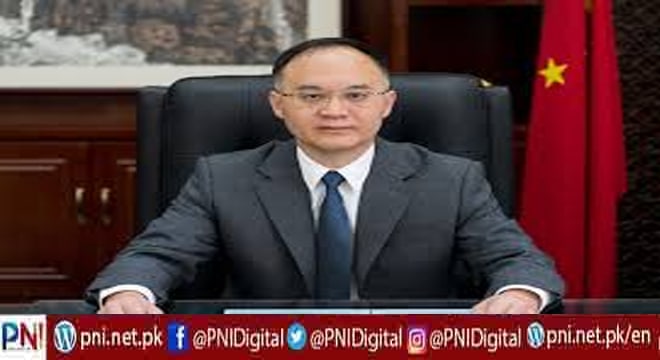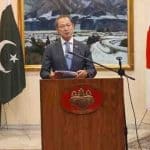A few days ago, the 20th National Congress of the Communist Party of China was successfully concluded, and so was Prime Minister Shehbaz’s maiden official visit to China. For China and China-Pakistan relations, these two major events came one after another; the significance is self-evident and far-reaching.
The 20th CPC National Congress took place at a critical time as China embarks on a new journey to build into a modern socialist country in all respects and advance toward the Second Centenary Goal. It has charted the course and established the guide to action for the cause of the Party and the country.
General Secretary Xi Jinping was re-elected by a unanimous vote at the first plenary session of the 20th CPC Central Committee. That will provide the most fundamental political guarantee for China to embark on a new journey towards a modern socialist country in all respects.
Facing a highly uncertain world, in which our times and history are changing in ways like never before, China is responding to these uncertainties with its own certainty, hedging the instability of the international situation with the stability of its domestic and foreign policies, and providing a strong and lasting impetus for the recovery of the world economies with high-quality development and high-level opening up, making unremitting efforts for the peaceful development of the region and the world with a responsible attitude. As President Xi told PM Shehbaz, China will continue its fundamental policy of opening up and providing new opportunities to Pakistan and the rest of the world through continuous development.
PM Shehbaz was the first head of government to visit China after the 20th CPC National Congress, and China received the Pakistani prime minister with premium courtesy. President Xi Jinping, Premier Li Keqiang and Chairman Li Zhanshu of the Standing Committee of the National People’s Congress held talks with him. Both sides issued a joint statement and signed or concluded a number of agreements/MoUs in the areas of e-commerce, digital economy, export of agricultural product, financial cooperation, protection of cultural property, infrastructure, flood relief, post-disaster reconstruction, Global Development Initiative, animal disease control, livelihood, cultural cooperation, space, geosciences as well as law enforcement and security.
President Xi met with PM Shehbaz twice in less than two months, and personally invited him to visit China immediately after the 20th National Congress. This well demonstrates the uniqueness of China-Pakistan relations and Pakistan’s important position in China’s overall diplomacy. This matchlessnes lies at the highest levels of strategic coordination and political mutual trust – this is why the term ‘ironclad friendship’ is used to describe the relationship between the two countries. Pakistan sees its relations with China as a cornerstone of its foreign policy. China, as President Xi told PM Shehbaz, views its relations with Pakistan from a strategic and long-term perspective, and puts it as a priority in China’s neighbourhood diplomacy.
The uniqueness of China-Pakistan relations lies in mutual support on issues concerning each other’s core interests. This year, Pakistan gave firm support to China in response to Nancy Pelosi’s visit to the Taiwan region and the attempts to stir up Xinjiang-related issues at the Human Rights Council. Likewise, China supports Pakistan in safeguarding its sovereignty, territorial integrity, security, and promoting its socio-economic development and prosperity.
Our close coordination has gone beyond the bilateral level to the multilateral and international arena, jointly promoting the implementation of the Global Development Initiative and the Global Security Initiative, and working together to make global governance more just and equitable.
China-Pakistan relations are also unmatched in the strong support of practical cooperation underpinned by the China-Pakistan Economic Corridor, which has played a leading role in the Belt and Road Initiative. Under CPEC, 47 projects have been started or completed, with a total investment of more than $25 billion, and 150,000 jobs have been created.
The 11th JCC was held on October 27, during which the leaders of the two countries reached an important consensus on the ML-1 project for its early implementation. China also agreed to actively advance the Karachi Circular Railway and encourage Chinese enterprises to participate in solar and other renewable energy projects.
In the next phase of CPEC, we will step up cooperation in industry, agriculture, science and technology to better serve Pakistan’s industrialization and enhance its export competitiveness. New concepts like health corridor, industrial corridor, digital corridor and green corridor will become an important part of the high-quality development of CPEC. Moreover, Pakistan’s exports to China are expected to exceed $4 billion this year. Among them, agriculture serves as an emerging growth area.
Pakistan’s agricultural trade surplus with China reached $640 million last year, an increase of 13 times year-on-year. During this visit, facilitation arrangements for cherry exports to China were made. China welcomes Pakistan to explore China’s mega-market; the country also welcomes more high-quality Pakistani food and agricultural products for entry. Pakistan’s efforts to strengthen security guarantees for Chinese investors, and efforts to solve the issues facing the CPEC IPPs will help encourage Chinese investors to start businesses in Pakistan and unleash a broader potential for business cooperation.
China-Pakistan relations are further unique also due to the sincerity between the two to help each other through it all. China’s people will not forget that after the 2008 Wenchuan earthquake, Pakistan donated all tents in reserve. Facing unprecedented floods in Pakistan this year, China in no time provided Pakistan a full range of assistance, with the total amount of funds and materials reaching 660 million yuan. During PM Shehbaz’s visit, China announced an extra 500 million yuan emergency aid for post-disaster reconstruction, making the total aid to 1.16 billion yuan (36 billion rupees), ranking first among other countries.
China also sent expert teams on post-disaster assessment and healthcare to Pakistan to assist in disaster relief and reconstruction.
The two countries also enjoy close cooperation, trust and communication between the armed forces of the two countries, and will continue to advance military and security cooperation. In the field of culture, Pakistan and China extended the agreement on cultural cooperation and its implementation plan to 2027.
The year 2023 will usher in the China-Pakistan Year of Tourism and Exchange, and the Gandhara Art Exhibition will be held at the Palace Museum in Beijing to showcase Pakistan’s diverse culture and long history of interaction with China.
With the easing of the pandemic, the issue of Pakistani students returning to China has been effectively resolved. The gradual resumption of direct flights operation with more frequency, people-to-people exchanges between the two countries will surely become more active.
Standing at a new historical stage, as the Chinese ambassador to Pakistan I have more confidence and higher expectations for the future of our bilateral relations. We will work closely with the Pakistani side to fully implement the outcomes of PM Shehbaz’s visit to China, illustrating the opportunities and significance of the 20th CPC National Congress for China, Pakistan and the world, speed up to a closer China-Pakistan community with a shared future in the new era, and inject new impetus into our All-Weather Strategic Cooperative Partnership.
The writer is ambassador of the People’s Republic of China to Pakistan.
Follow the PNI Facebook page for the latest news and updates.









